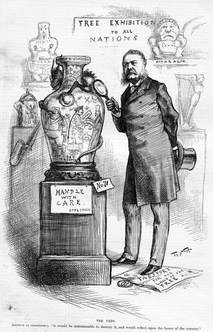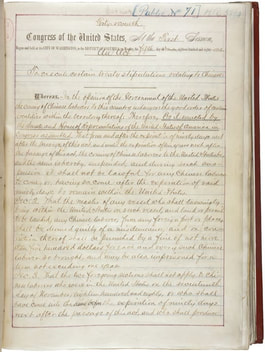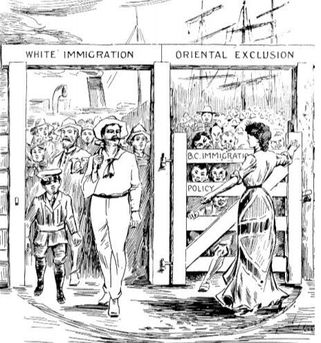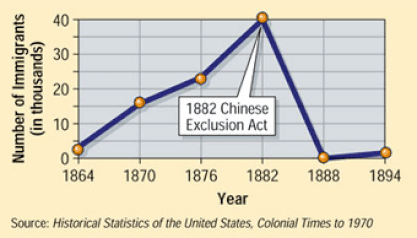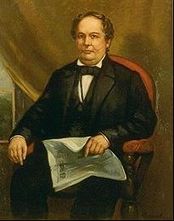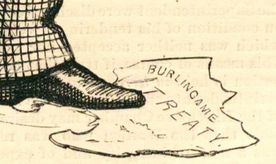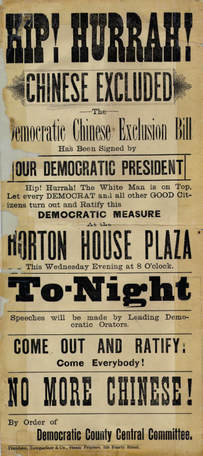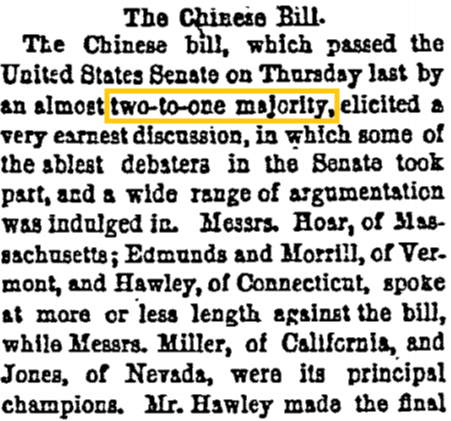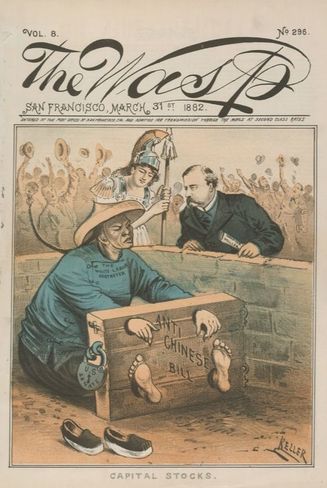Decades of discrimination against immigrants culminated in the Chinese Exclusion Act of 1882. The Act itself was a compromise made by the government to appease widespread anti-Chinese sentiment among the people.
|
"The Chinese Exclusion Acts were scapegoat measures pure and simple, pandering to public prejudices."
-Professor Gordon Chang (Stanford University Press) |
"The government believed it was their responsibility to placate the citizens; to do something drastic to combat the riots and poor economy."
-Stuart Miller (The Unwelcome Immigrant) |
"The Pacific Coast is cursed with parasites from China and used as a weapon by the capitalists to oppress the poor laboring men... But let me tell you here tonight, that the laboring men of California... have captured the State, and they are going to take care of the Asiatic leper.”
-Denis Kearney, President of the WPC, 1878 ("Rally Speech")
-Denis Kearney, President of the WPC, 1878 ("Rally Speech")
Passed by Congress and signed by President Chester A. Arthur, this law barred Chinese laborers from entering the United States and prevented all Chinese immigrants from being naturalized as citizens for 10 years.
|
"Whereas, in the opinion of the Government of the United States the coming of Chinese laborers to this country endangers the good order of certain localities within the territory thereof: Therefore, be it enacted...that... until the expiration of ten years next after the passage of this act, the coming of Chinese laborers to the United States be, and the same is hereby, suspended."
-The Chinese Exclusion Act, 1882 (Library of Congress) |
| |||||||
"For the American government addressing the question of Chinese exclusion, the challenge was to balance domestic attitudes, which dictated an anti-Chinese policy, while maintaining good diplomatic relations with China, where exclusion would be a violation of treaty promises. The domestic factors trumped international concerns. The Chinese government considered this act a direct insult, but was unable to prevent its passage. Chinese merchants responded to the humiliation of the exclusion acts by organizing an anti-American boycott in 1905."
-U.S. Office of the Historian
-U.S. Office of the Historian
|
The Chinese Exclusion Act was the first law to ever ban a group from the United States on the basis of race.
"Beginning in 1882, the United States stopped being a nation of immigrants that welcomed foreigners without restrictions, borders or gates. Instead, it became a gatekeeping nation. In the process, the very definition of what it meant to be an 'American' became even more exclusionary."
-Erika Lee (At America's Gates: Chinese Immigration During the Exclusion Era) |
Although the Chinese Exclusion Act received both support and opposition in the government, it was met with approval by a majority of Americans.
|
Support
|
Opposition
|
|
"To preserve the tranquility of the State, measures must be adopted to check this tide of Asiatic immigration, and prevent the exportation by them of the precious metals which they dig up from our soil without charge, and without assuming any of the obligations imposed upon citizens."
-Governor John Bigler, 1852 ("Message on Chinese Immigration") |
"If we did not want problems like these, we should not have put up the Stars and Stripes and invited all the world to come, be free, work and help make the continent of wilderness blossom like a rose."
-Senator Joseph Hawley, 1882 ("Statement On the Chinese Bill") |
